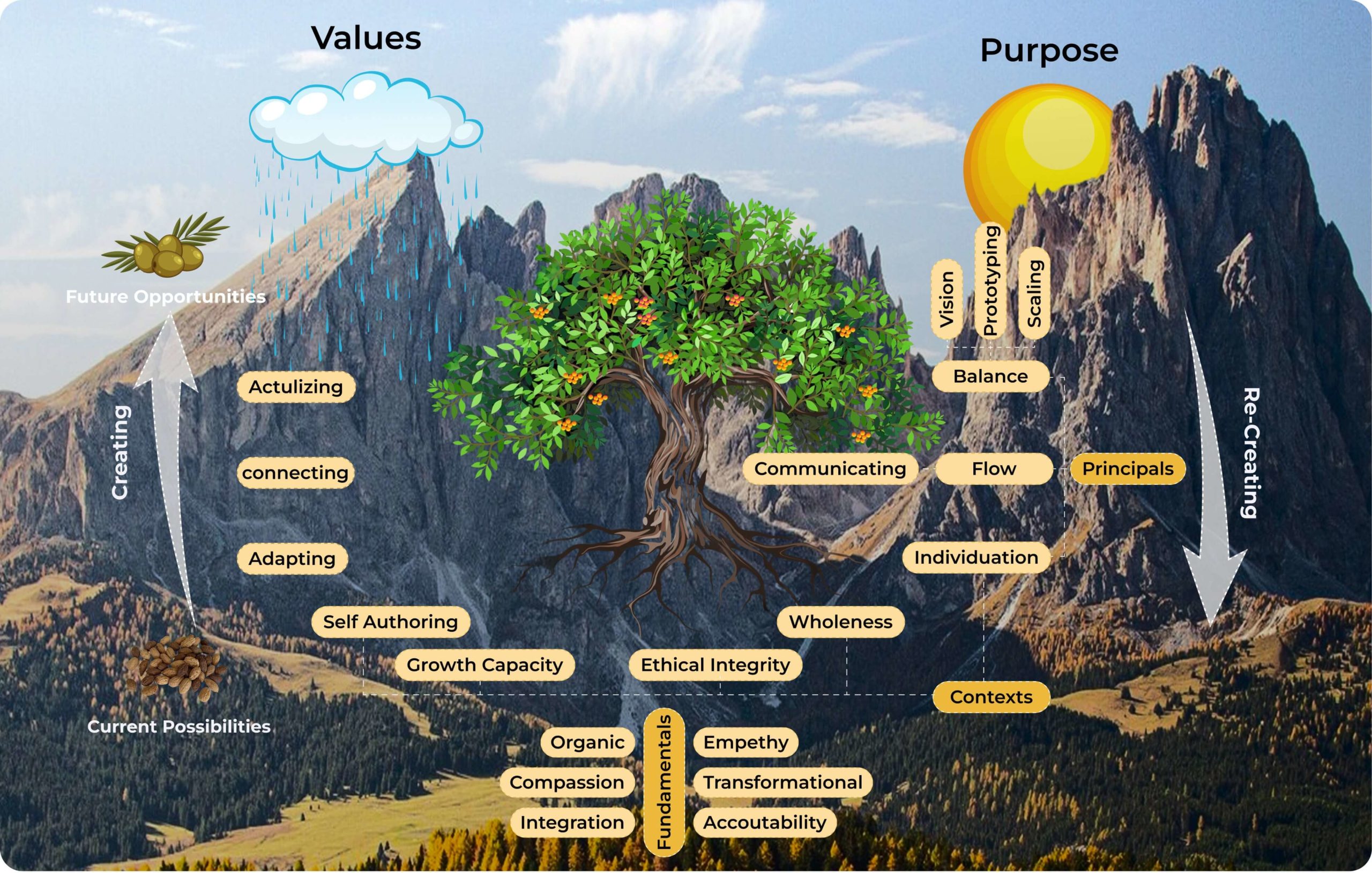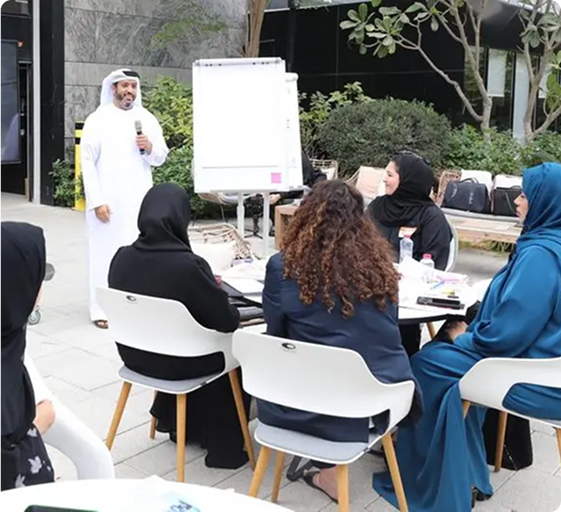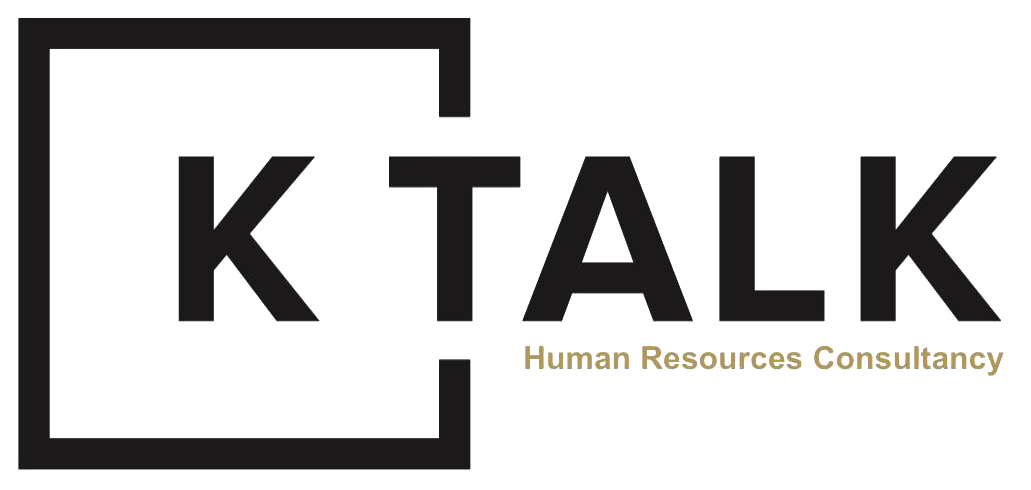Certification Program
Master the craft. Prove the impact.
Empowering coaches to create organic, sustainable and compassionate transformation for individuals, organisations, and the wider world.
Programmes grounded in practice, evidence, and ethics building real-world capability, embedding humane ways of working, and tracking measurable outcomes. Live skills labs, observed coaching with time-stamped feedback, and structured mentoring convert insight into adoption; impact is evidenced through competency growth, client results, and sustained behaviour change across individuals, teams, and organisations.
What is OTC Coaching?
Where Inner Evolution Meets Outer Impact
The Organic Transformation Coaching (OTC) Model emerged as a beacon for meaningful, lasting change. Drawing inspiration from the life of a tree,rooted, growing, and bearing fruit,it embodies the natural rhythm of transformation, from seeds of intention, to deep roots of self-awareness, to flourishing branches of purpose and impact .
At its core, OTC is more than a coaching methodology,it is a transformational journey. It invites you to explore and integrate your inner world and outer reality through conscious attention, deep listening, and authentic connection. By aligning with your core values and a higher sense of purpose, you unlock the clarity, courage, and creativity to lead change in any domain of life.
When you step into the OTC journey, you don’t just learn to coach,you learn to live, lead, and transform organically.

Our Vision
To stand at the forefront of a global movement in organic transformation, empowering people and systems through education to evolve and perform with authenticity, resilience, and purpose.
Our Mission
To create learning journeys that catalyse profound inner and outer change, equipping individuals, organisations, and communities to cultivate sustainable growth, forge meaningful connections, and deliver transformative impact across every sphere of life.
Organic Transformation Coaching (OTC) Model
A model for sustainable change across people, organisations, and systems
The OTC Model is a dynamic, practice-ready framework that translates core principles into actionable strategies enabling profound, values-driven shifts that endure. It empowers sustainable growth in individuals, families, communities, organisations, and wider systems by aligning inner evolution (purpose, awareness, ethics) with outer impact (behaviours, relationships, operating rhythms).
Where it applies
- Individuals: Clarify purpose, build resilience, turn insight into daily habits.
- Families & communities: Strengthen connection, foster constructive dialogue, amplify shared wellbeing.
- Organisations & teams: Fuel innovation, optimise efficiency, and build adaptability through clear ways of working.
- Societal & environmental contexts: Extend impact to social responsibility and stewardship that lasts.
What makes OTC distinctive
Change is organic and values-led, emerging naturally from intrinsic beliefs and ethical considerations so adoption sticks and impact is measurable and sustained.

OTC Model is a journey from Current Possibilities to future opportunities
A structured, human-centred journey that links inner evolution to outer impact. The OTC model clarifies intent, deepens self-awareness, and converts insight into habits, relationships, and operating rhythms so today’s possibilities become tomorrow’s opportunities, measured in visible behaviour change and real-world results.
A Leader: Harness OTC’s profound communication style to deepen connection, inspire transformation in people and culture, and achieve strategic organizational goals in a healthy, safe environment.
An Internal or External OTC Coach: Support organizations in achieving sustainable transformation through values-based coaching.
A Coaching Business Owner or Entrepreneur: Build your own coaching practice or startup grounded in authenticity and sustainable impact.
An Ambassador for Change: Lead positive transformation within your organization, society, family, or social group.
A Social Worker or NGO Contributor: Apply OTC principles to empower individuals and communities, and support those in need.
An Individual on a Growth Journey: Enhance self-awareness, interpersonal communication, and relationships with those around you.
A Values-Driven Professional: Establish an ethical foundation that strengthens your reputation and fosters lasting, productive relationships.

We elevate mindsets and transform culture
KTalk Learning Methodology
Emphasise the who so the what flows
An organic, experiential approach that integrates the inner world (values, awareness, intention) with the outer world(behaviours, relationships, systems). Learners practise full attention, conscious listening, and clear communication, connecting to what serves their values and aligns with the deeper purpose of the change they seek. The result is learning that feels authentic and translates into meaningful action.
Pillars
- Who before What clarify identity, values, and intention; outcomes follow.
- Inner × Outer Integration self-awareness tied to real work, relationships, and systems.
- Experiential by Design live practice, reflection, and on-the-job experiments over theory alone.
- Conscious Communication attentive listening, purposeful dialogue, constructive feedback.
- Purpose & Values Alignment connect choices to what matters most to sustain change.
- Reflect & Measure pause, sense, adjust; track visible shifts in behaviour and results.
Start with the who and allow the what to flow. Experiential learning that aligns inner clarity with outer impact.
OTC Learning philosophy
From roots to fruits. Like the olive tree, the journey moves from current possibilities to future opportunities, honouring the whole person through an organic framework of Individuation, Flow, Balance, and Crystallisation.
The four movements
- Individuation deepen self-awareness and integration; align values, strengths, and identity.
- Flow cultivates presence, resonance, and responsiveness; meet the moment with clarity.
- Balance harmonise inner ↔ outer, being ↔ doing, self ↔ system; choose wise trade-offs.
- Crystallisation clarifies intent and translates insight into action and impact; make change visible.
What It Enables
- Authentic and sustainable transformation growth at a human pace, anchored in purpose.
- System-aware change shifting from an ego-system to an eco-system, where individuals and living systems co-create and continually renew and re-create themselves.
- Practical adoption inner work expressed as daily habits, behaviours, and outcomes that endure.
Roots to fruits. Whole-person learning that turns inner clarity into outer impact.
Continuous learning and support
Stay connected to growth before, during, and after.
On-demand resources, periodic guidance, and peer accountability turn practice into habit and habit into results. Simple trackers and milestones keep progress visible and momentum high.
- Unlimited Portal Access 24/7 tools, templates, recordings, and new resources on demand.
- Ongoing Guidance Scheduled check-ins, office hours, and timely nudges for steady progress.
- Peer Community Cohort forums, practice circles, and accountability partners to learn and grow together.
- Meaningful Connections Facilitated dialogues, collaboration spaces, and an active alumni network to sustain momentum.
- Visible Progress Lightweight trackers for competencies, habits, and milestones improvement you can see.
Learning that stays alive: continuous, supported, community-powered
The Added Value of the OTC Model
OTC is a journey from Current Possibilities to Future Opportunities linking inner clarity to outer results. Starting with intention and self-awareness, the model translates insight into habits, relationships, and operating rhythms that scale across teams and systems. Because change is values-led and evidence-tracked (adoption, proficiency, outcomes), progress is not only felt by people, it’s proved in performance and sustained over time.
- Holistic & Practical
Applies across every life domain individual, family, community, organisation and converts inner work into daily habits and measurable results. - Flexible & Integrative
Inclusive, adaptive, and rigorous studies, developed, tested, reviewed, and refined to fit real contexts and diverse learners. - Transformational & Unique
Expands your range, perspective, and presence so you can expand the capacity and impact of others with confidence. - Values, Purpose & Strategy
Strengthens communication, connection, trust, and meaning fueling sustainable success and long-term fulfilment. - Quality & Accreditation
Designed and delivered to meet ICF Level 2/3 requirements toward the PCC/MCC credential, aligned with the ICF Code of Ethics and Core Competencies. - For Coaches and for Anyone Growing
Whether or not coaching becomes your profession, OTC offers a robust pathway for organic self-development and lasting change.
In sum: OTC turns current possibilities into future opportunities aligning values with behaviour and translating insight into daily habits, relationships, and operating rhythms. Designed for coaches and anyone growing, it delivers change that is human, sustainable, and evidence-tracked felt by people, proven in performance, and sustained over time.

The Science Behind the OTC Model
The Organic Transformation Coaching (OTC) Model is a powerful, holistic approach to personal and system development that integrates contemporary neuroscience to foster transformative results. When someone joins the OTC coach training program, they invest time, energy, and money to change their life and career for the better. As their training provider at K-Talk, our role is to serve them with rigor and care. We want clients to know that our approach is rooted in evidence-based scientific research. Below, we outline the science behind the four foundational roots of the OTC Model and why this coaching reliably evokes effective, sustainable transformation.
Root 1: Presence & Listening From the Whole
Core idea: Deep, mindful presence and high-quality listening create the conditions for awareness-based change.
- Theory U (Otto Scharmer, MIT Presencing Institute): An organic progression of transformation driven by enhanced listening and multi-level sensing.
How it informs OTC: We cultivate presencing, suspend habitual judgments, and “listen from the whole” to let wiser responses emerge. - Presence (Senge, Scharmer, Jaworski, Flowers): Capabilities to see, sense, and realize new possibilities across self, organizations, and society.
How it informs OTC: We design reflective and sensing practices that expand perception and choice. - Mindfulness & Attention Training: Empirical work links mindfulness with improved empathy, compassion, emotion regulation, and resilience.
How it informs OTC: Breath, stillness, and body-based practices stabilize state and strengthen coach client attunement. - Relational Neuroscience (incl. mirror-neuron research): Neural mechanisms are implicated in empathic resonance and social understanding (evidence evolving).
How it informs OTC: We emphasize regulated presence and attunement to foster safety, trust, and effective communication.
Root 2: Organic Growth, Motivation & Well-Being
Core idea: People grow best when their intrinsic needs and strengths are engaged.
- Positive Psychology / Strengths Use: Leveraging strengths increases well-being and performance over time.
How it informs OTC: We start from what’s strong to amplify energy and progress. - Self-Determination Theory (Deci & Ryan): Autonomy, competence, and relatedness drive intrinsic motivation and healthy development.
How it informs OTC: Agreements, choice, and supportive challenges are built into sessions and rituals. - PERMA Well-Being Theory (Seligman): Positive emotion, engagement, relationships, meaning, achievement.
How it informs OTC: We design habits and environments that lift these five pillars in daily work. - Mindset & Pro-social Emotions: Growth mindset language plus empathy/compassion practices predict persistence and healthier collaboration.
How it informs OTC: Clear, kind accountability and compassion co-exist in the way we set goals and give feedback. - Shame, Vulnerability & Accountability (Brené Brown’s research): Cultures of courage and accountability reduce defensiveness and enable learning.
How it informs OTC: We normalize courageous conversations and “clean” agreements.
Root 3: Learning, Change & Neuroplasticity
Core idea: Repeated, well-designed practice rewires the brain and behavior.
- Neuroplasticity: The brain changes with focused attention, practice, and experience; new pathways stabilize with repetition.
How it informs OTC: Micro-practices and cadenced check-ins convert insight into automatic habits. - Experiential Learning (Kolb): Concrete Experience → Reflective Observation → Abstract Conceptualization → Active Experimentation.
How it informs OTC: OTC Cycle: Individuation → Flow → Balance → Crystallization, maps to and operationalizes Kolb. - Conscious Competence Model (Howell): From “unconscious incompetence” to “unconscious competence.”
How it informs OTC: We name the stage, target the next rep, and measure progress simply. - Stages of Change (Prochaska & DiClemente): Tailoring interventions to readiness (from pre-contemplation to maintenance).
How it informs OTC: We match the coaching move to the client’s stage and build relapse-resilient plans. - Behavioral Design: Goals, implementation intentions, and environment cues increase follow-through.
How it informs OTC: “If-then” plans, friction-less cues, and visible rituals make action sticky.
Root 4: Integration, Wholeness & Systems
Core idea: Sustainable results come from integrating the whole person within the whole system.
- Biopsychosocial Model: Health and behavior arise from intertwined biological, psychological, and social factors.
How it informs OTC: We coach the person (not just the topic) and consider team/organizational context. - Hemispheric/Functional Integration: Engaging analytic and creative networks broadens problem-solving and insight.
How it informs OTC: Dialogue and practices intentionally cross “modes” (data & story, metrics & meaning). - Emotional Intelligence (Goleman): Self-awareness, self-management, social awareness, relationship management.
How it informs OTC: We train the micro-skills behind presence, empathy, and clean communication. - Jungian Individuation: Becoming a more integrated, self-authored whole.
How it informs OTC: We support shadow integration, values clarity, and authentic leadership. - Creativity–Effectiveness Link (Anderson’s Mastering Leadership): Creative orientation predicts sustainable impact.
How it informs OTC: Our principles of Individuation, Flow, and Balance connect purpose with scalable results. - Professional Standards (ICF): Core Competencies and Code of Ethics as the “gold standard.”
How it informs OTC: Ethical practice, clear agreements, partnership, and measurable outcomes.
Representative References (For Due Diligence)
Scharmer-Theory U; Senge et al.- Presence · Deci & Ryan-Self-Determination Theory · Seligman-PERMA · Kolb-Experiential Learning · Howell-Conscious-Competence model · Prochaska & DiClemente-Stages of Change · Goleman-Emotional Intelligence · Anderson & Adams-Mastering Leadership · Peer-reviewed work on mindfulness, neuroplasticity, strengths use, and functional hemispheric connectivity (selection available upon request).
Together, these foundations power the OTC Coaching Cycle so that insight becomes habit and personal growth scales into organizational results. We use the science pragmatically (never dogmatically), stay transparent where evidence is evolving, and hold ourselves to the ICF gold standard. The commitment is simple: practical rigor interventions you can feel, measure, and sustain.

Statement of Ethical Standards, Integrity, and Transparency
Non-negotiable ethics.
KTalk adheres to the International Coaching Federation (ICF) Code of Ethics its core values, ethical principles, and professional standards. Ethical practice is foundational and reflected in the very first ICF core competency.
Integrity in how we operate.
KTalk commits to conduct that is honest, accountable, and transparent for our faculty, associates, participants, and partners. We set clear expectations, disclose limits, and welcome scrutiny.
Our Commitments
Ethics-first delivery
- Informed consent for all programmes, assessments, and recordings.
- Confidentiality protected by NDA and least-privilege data access.
- Clear boundaries: coaching ≠ therapy or consulting; appropriate referrals when needed.
- Conflict of interest declared, managed, or avoided.
- Continuous development: supervision/mentoring and CPD for coaches and faculty.
Truth in Information & Marketing
- No manipulative or high-pressure sales tactics.
- Accurate representation of curriculum, hours, outcomes, and accreditation (certificate vs credential is clearly distinguished).
- No exaggerated claims, fabricated testimonials, or undisclosed incentives.
Transparent Commercial Practice
- Fair, published pricing with eligibility for scholarships/enterprise rates where applicable.
- Clear cancellation, deferral, and refund policies before enrolment.
- Straightforward contracts: scope, deliverables, assessment criteria, and data handling spelled out.
Data Privacy & Security
- Encrypted storage, defined retention/deletion schedules, and consent-based use of recordings.
- Aggregated, anonymised reporting for sponsors; no personal coaching content disclosed.
Inclusion & Accessibility
- Zero discrimination; reasonable adjustments for language, disability, and time zones.
- Respectful learning environments with psychological safety by design.
Reporting & Accountability
- Named point of contact for concerns, complaints, and ethics issues with documented response timelines.
- Where relevant, cooperation with ICF pathways for ethical review.
In practice: KTalk holds itself and its participants to the highest ethical standards, delivers programmes with clarity and candour, and provides a secure, respectful, and transparent experience from first enquiry to graduation.
Non-Discremenation Policy
Zero tolerance. Equal opportunity. Respect for all.
Purpose: To ensure every employee, learner, and partner experiences a workplace and learning environment that is free from discrimination, harassment, and retaliation.
Scope: Applies to all KTalk employees, applicants, students/participants, contractors, volunteers, vendors, and visitors across all programmes, locations, and delivery modes (on-site, virtual, hybrid).
Policy Statement: KTalk is an equal opportunity organisation. Decisions in recruitment, hiring, assignment, training, promotion, compensation, and separation are made without discrimination based on (including but not limited to): race, colour, creed, religion, national origin, age, gender, marital/civil status, disability, veteran or military status. Participation in our programmes is open to all on the same basis.

Prohibited Conduct
- Discrimination: Any adverse action or unequal treatment on a protected basis.
- Harassment: Unwelcome conduct (verbal, non-verbal, visual, physical) that creates a hostile, intimidating, or offensive environment.
- Retaliation: Any adverse action against an individual for raising a concern, reporting a violation, or participating in an investigation.
Expectations & Responsibilities
- All personnel must treat others with dignity and respect; discriminatory comments, jokes, images, or behaviours are prohibited.
- Leaders/managers/faculty must act promptly on concerns, model inclusive conduct, and ensure fair access to opportunities.
- Vendors/contractors must comply with this policy as a condition of engagement.
Accessible & Inclusive Participation
- Reasonable accommodations/adjustments are available for disability, religion, pregnancy, and other legitimate needs.
- Delivery materials and environments are designed to support accessibility and psychological safety.
Reporting & Grievance
- Individuals are encouraged to report concerns through the published grievance procedure (to a manager, HR/Programme Lead, or designated ethics contact).
- Reports may be made confidentially and without fear of retaliation. Anonymous options are available where permitted.
Investigation & Resolution
- KTalk will promptly investigate all reports.
- Findings will be addressed with appropriate remedial and disciplinary action, up to and including termination of employment/contract or removal from programmes.
- Parties will be informed of outcomes to the extent appropriate.
Non-Retaliation: Retaliation against anyone who, in good faith, raises a concern or participates in an inquiry is strictly prohibited and will result in disciplinary action.
Training & Awareness: Regular training reinforces standards, reporting options, and responsibilities. Leaders receive additional guidance on inclusive practice and bias prevention.
Policy Governance: Questions or requests for accommodation may be directed to HR / Programme Administration. This policy is reviewed annually and updated as needed.
Statement of commitment: KTalk is committed to an environment where everyone can learn and work free from discrimination and harassment—and where concerns are heard and resolved quickly, fairly, and respectfully.
Meet Our Team
Program Training Leaders & Instructors


